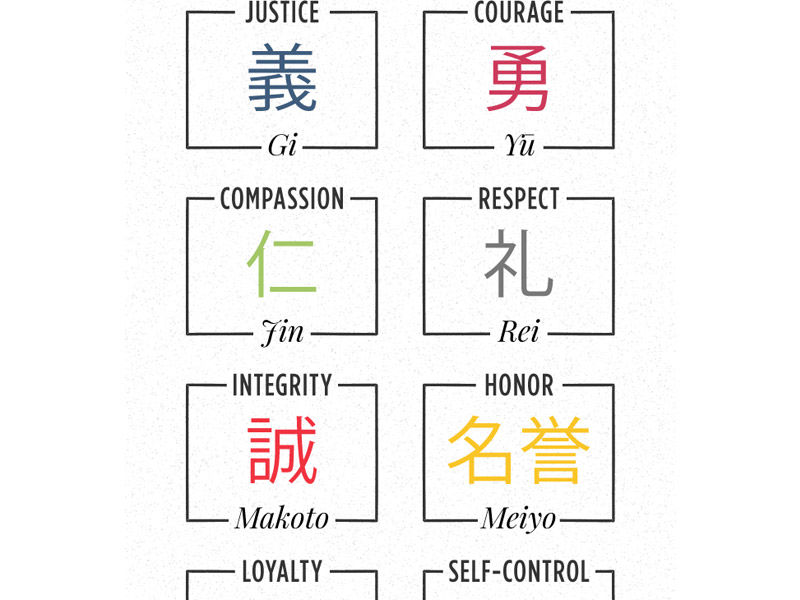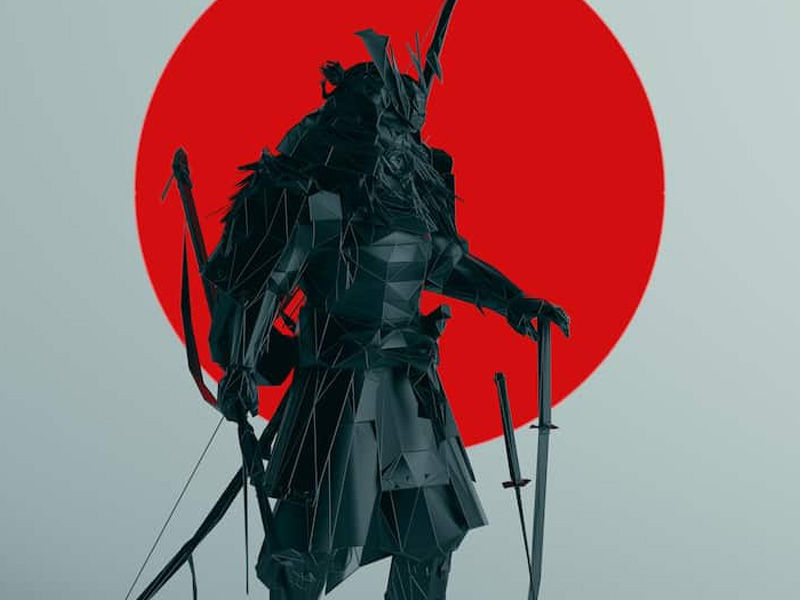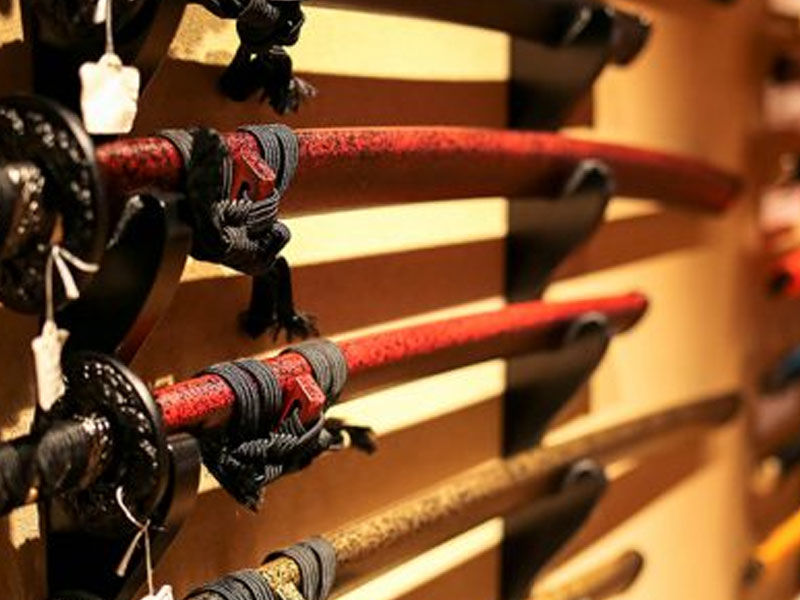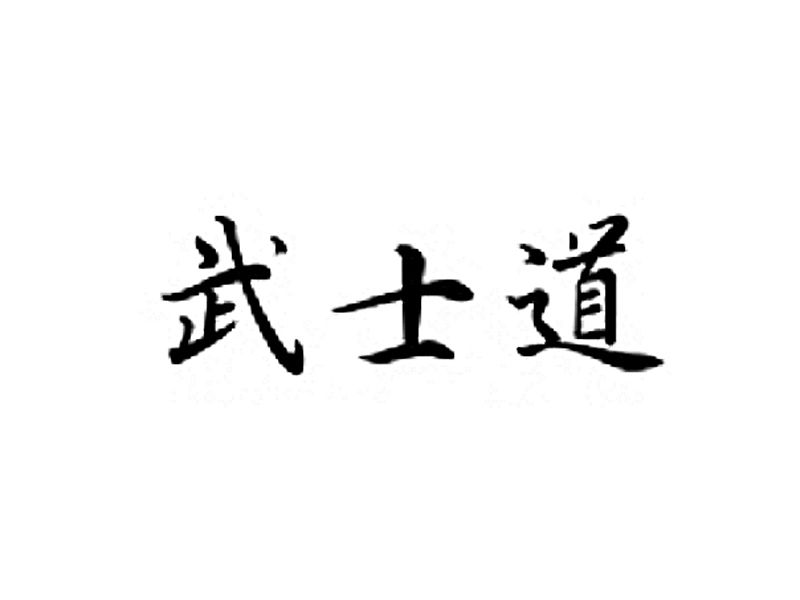To expand Asian literature, Japanese ideals, and many significant rituals, including tea ceremonies and SAMURAI sword-making, the Bushido code of ethics, loosely linked to SAMURAI culture, played an important part. Bushido later became the foundation of the teaching of ethics in Japan and became an unwritten code of rivalry, with values still applicable today. Below our editors discuss the origins of the Bushido Code, the Samurai Code, and how the Code can be used in daily life.
What is Bushido?
Bushido has arisen from the Samurai or Japanese warriors in Japan, spreading their beliefs in society. They were inspired by the Confucian doctrine and value system, which are relatively conservative and emphasize allegiance and service. The Bushido code includes eight key rules or ideals to be upheld by warriors.

The 8 Principles
Justice:
Bushido applies to martial truth and individual correctness: Justice is Bushido’s most strong virtue. It is described in this way by a well-known samurai: ‘rectitude is a power of the person to determine a behavior according to reason without wavering; killing when it is right to die; striking when it is right to attack.’ Another one says: ‘Rectitude is the bone that provides solidity and stature. The head cannot sit on the back without limbs, nor shift hands, nor stand feet. Thus, neither ability nor learning can turn a human structure into a samurai without righteousness.’
Justice is the Samurai’s fundamental virtue. The inclusion of the Bushido theory of justice in your life calls for reflection on just matters and the importance of good character to be upheld.
Courage:
Bushido differentiates courage from bravery: Courage is dignified only when displayed in the name of justice and righteousness. Confucius says in his Analects: ‘There is no lack of courage in experiencing what is right and doing it.’ Simply put: ‘Courage does the right thing.’
Courage is about decrypting what is right and what is wrong, as is justice. Courage demands not only the courage to understand but also to act.
Compassion:
A man with the ability to control and the power to kill must have similarly exceptional strength of benevolence and compassion: love, magnanimity, affection for others, compassion, and compassion are characteristics of blessing, the highest qualities of the human spirit. The greatest demand of a ruler of man is also claimed to be better, both by Confucius and Mencius.
The desire to express love and sympathy through patience is compassion. It also involves trying to look at the universe from another’s perspective. For anyone in a leadership capacity, this is a special feature.
Respect:
It may be difficult for casual tourists to Japan to distinguish between obsequiousness and politeness. Still, courtship is based on benevolence for a true person: Both international tourists are recognized as distinctive Japanese characters by courtesy and good manners. But polite should show benevolent respect for others’ feelings; this is a bad virtue if inspired solely by a suspicion that good tastes are offended. Solitude addresses passion in its finest shape.
Respect ensures that you recognize the appreciation of others’ experiences and emotions. Politicizing must be used to work with another human.
Integrity:
True Samurai disdained money, according to Nitobe, claiming that “people would rebel against money for wealth to prevent knowledge.” Thus, high-ranking samurai children were raised to think that speaking of money displayed bad taste. Their misunderstanding of the worth of various coins demonstrated good breeding: Bushido promoted thrift and the practice of abstinence, not for economic purposes alone. Luxury was considered the biggest threat to manhood. The class of warriors ought to be very simpler … the counter machine and the abacus were abhorred.
One must uphold integrity to practice several of the other values. That means honest and honest living.
Honor:
Although Bushido deals with the soldier’s career, he is also interested in non-martial conduct: The Samurai is distinguished by the value of honor, a vibrant sense of honesty, and dignity. Born and raised to appreciate his profession’s tasks and rights. Awe of shame hung over the Samurai’s head like a blade… It was mocked as ‘short-tempered’ to take offense at mild provocation. According to the traditional saying: ‘True patience means the wearable.’
The warriors were Samurai who maintained a sense of self-worth and acted by the highest Code of conduct. You must recognize the spiritual obligation to respect the concept of honor.
Faithfulness:
The economic fact has battered international corporate commitment. Nevertheless, real men remain faithful to those they owe: the most distinctive virtue of the feudal period was loyalty to a superior. There is personal fidelity for all manner of people: the pickpocket group swears loyalty to its leader. Yet loyalty is of vital significance only in the Code of chivalrous honor.
Hold true to yourself first. This must not be abandoned even in challenging situations, where fealty is offered to another individual.
Self-control:
Bushido encourages men to comply with an absolute moral principle that transcends logic. It’s right, and the wrong things are incorrect. There are no arguments open to debate or reasoning, nor distinguish between good and evil and between right and wrong, and one man should know the difference. Finally, by his behavior model, a man must teach his children moral values. The first goal was to create the character—Samurai schooling. There were less nuanced abilities in prudence, intellect, and dialectics. Intellectual dominance was appreciated, but a samurai was mostly an activist.
Self-control in the Bushido code means strict adherence to this Code under all situations, when with someone else and alone. Any version of the Bushido code does not contain self-control. Still, the Bushido: Inazo Nitobe’s Soul of Japan emphasizes its significance.
No scholar would contend that in his life, Hideyoshi has personified Bushido’s eight virtues. Like many great men, his towering talents were accompanied by profound defects. Yet, he showed ancient virtues of manliness by preferring sympathy for conflict and benevolence for belligerence. He can’t be more timely today in his classes.
Roots of the Bushido Code
The term “Bushi,” which is synonymous with a fighter, is used to root the word “bushido.” The term samurai means literally “who serves,” but it means “warrior.” The origin of the Samurai must be examined to grasp the foundations of the Bushido code.

The origin of the Samurai started in the 8th century when rich landlords began to be recognized as Samurai as armed supporters. In Japan, control was transferred towards the end of the 12th century, and the military dictatorship of Kamakura Shogunate was established. During that period, the leaders popularized and codified the use of Samurai.
After a time of turmoil, the regime was destabilized that led to the Kamakura period at the end of the XIVth century. The Tokugawa Shogunate was a long era of stability. The Samurai had no longer to have military strength during this time of stability and prosperity. Still, they had rather been called upon to direct civilian government. Slowly, their position has changed from a kind of ruler to a government official’s responsibilities.
The Japanese art, common amongst Samurai art, began to thrive in the Tokugawa era. These included tea ceremonies, rock gardens, flower arrangements, and a distinctive style of Japanese painting produced during the Edo era.
The Military Houses or Shohatto Buke Ordinance was issued in 1615, and Samurai had to practice not only power but also civility, politeness, and political affairs. During this period, the Bushido rules were developed as the Code of conduct for Japanese citizens in general, which was heavily affected by the Samurai, Buddhism, and Confucianism. As an epitome of cultured manhood, the concept of Samurai was cemented.
In general, the Bushido Code requires respect for life and appreciation, teaching people to exemplify and demonstrate kind-heartedness and show compassion.
Significance of the Bushido Code in Modern Day society

The State Religion of Japan was founded by Shinto at the beginning of the 1900s. Its moral principles were the Bushido code. Today in Japanese society, there is still a deep sense of honor, order, commitment, and dedication. These principles made the government, along with the US, England, France, and Italy, one of the big five powers during the First World War. The nation, which came into being as a major economic and industrial force following World War II, may partly build upon the concepts of Bushido.
When samurai shift from soldiers to respected gentlemen, often living on both plains, today’s culture is already lessons learned. Many leaders in the world are upholding them.




























